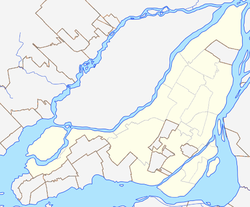| Jardin Tiki | |
|---|---|
 Jardin Tiki's marquee | |
| Restaurant information | |
| Established | 1986 |
| Closed | March 28, 2015 |
| Owner | Danny Chan |
| Food type | Canadian Chinese cuisine |
| Dress code | Casual |
| Location | 5300 Sherbrooke Street East, Quebec, H1V 1A1, Canada |
| Coordinates | 45°34′05″N73°33′10″W / 45.568148°N 73.552645°W |
| Website | jardintiki.com (archive) |
Jardin Tiki was a tiki-themed buffet restaurant established in 1986 in Montreal, Quebec, Canada, and closed 28 March 2015.





